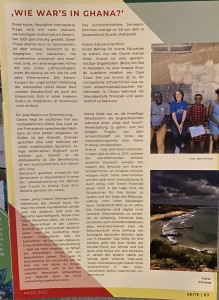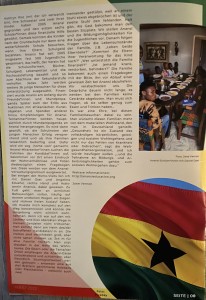“Wie war’s in Ghana?” (written for German readers with little familiarity with Ghana)
After my four-week stay in Ghana in December 2021, this short, friendly question was one I frequently heard. Answering briefly is, however, not easy. This would perhaps be my short answer: I encountered people who were for the most part dignified and reserved, a strenuous climate with very high humidity, more bureaucracy than I care to deal with, and I experienced a very steep learning curve. The effects of the unfair distribution of the material goods of this world became painfully clear as the difficulty of finding one’s place in another culture.
A few basic facts about and impressions of Ghana for starters –
Ghana is located in the southern part of northwestern Africa. Its neighbors on three sides are French-speaking countries; the southern border is the Atlantic coast, which is just shy of 400 miles north of the equator. Ghanaians speak one or more of the many traditional languages. English is the official language of the country, but not all Ghanians speak it fluently. The population is young. (The average age is 21.5). Statistically speaking, life expectancy in Ghana is the same as the retirement age of about 65 in Germany. The streets are vibrantly alive with ‘petty traders’ and taxi-drivers. The most common and cheapest form of transportation is by ‘shared taxi’, which you thumb down wherever you may be on the roadside. In contrast to Germany, one rarely sees anyone who smokes but is acutely aware of the difference in quality of life. This is apparent when one sees the makeshift repairs and the maintenance standards of objects of all types. No matter where you look, the most basic things for a comfortable life are lacking. What are regarded as basic necessities in Germany, are hard to find in Ghana. My search for rust remover at the market was fruitless. On reflection, this becomes understandable. Such things do not make it onto the shopping list because they are prohibitively expensive and thus undreamed of. The average annual income for Ghanaians is about 5% of that for Germans. (World Bank)
Anansi Educational NGO
The reason for my stay in Ghana was to make a contribution to the work of Anansi Education. Anansi is a non-profit organization with headquarters in Mpeasem, not an hour’s drive north of Cape Coast. The goal of Anansi is to support promising students from extremely low income families both financially and with counselling and mentoring.
My role as a volunteer was to help students with their English during one of the “Host-and-Teach” sessions.
Anansi Host-and-Teach sessions have been offered since 2017, since secondary education became free of charge. Tuition costs at private schools need no longer be paid by Anansi, but continuing support is, in fact, needed because parents are not able to afford schoolbooks, and because the state is not yet able to manage its secondary school program. In fact, wherever you look, the situation is dire. School principals are not hooked up to the Internet so record-keeping is extremely difficult. There are neither enough classrooms nor enough teachers which means that though Ghanaian youths are able to attend secondary school free of charge, a lack of resources means that students’ attendance is not regular. School takes place in quarterly ‘shifts’. The students are in school for three months, have a break from school for three months and return for a second quarter of instruction and so on. Anansi’s Host-and Teach sessions provide additional school lessons in the months when the students are not attending school.
Kathryn Roe (with whom I am related), her sister and two of her children founded Anansi in 2005 and supported the first six students financially. At that time, children could only attend a secondary school when their parents paid school fees. Anansi has sponsored nearly 500 students since then. ‘Sponsoring’ meant that the organization paid for school uniforms, books, tuition, food and cooking utensils to enable them to attain their secondary school qualifications. Initially, the work of Anansi was financed by friends and by word of mouth. As time went on, the sale of African art objects and other contributions began to play a role.
Every year, 36 young people are chosen for Anansi support. Recommendations for these scholarships are mostly made to the organization by word of mouth. The next steps are to see whether the students’ school grades indicate further success at school – and whether their families are truly in need. To this end, a so-called ‘home visit’ is made. Anansi co-workers visit the families at home and can form an impression of the living circumstances of the students. A set of questions is answered and presented to the Anansi board of directors for analysis and a final decision.
During several of these home visits, I accompanied Daniel Osei and Angelina Eduaful, Anansi Manager and Assistant respectively. One walks past shabby dwellings – often along extremely rough paths, where goats and chickens run free. I had little chance to take in the surroundings as sandals which would have been dependable footwear elsewhere were completely inadequate. I was hardly able to manage to pick my way along the paths, many of which are rocky, strewn with gravel and eroded by rainfall. One arrives at the dwellings of the candidates, which may be simple huts housing a whole family. One sits outside where family members receive the Anansi guests shyly and with friendly reserve. Seating is brought – either a wooden bench fashioned out of three solid boards or plastic chairs. Not seldom two plastic chairs are stacked together to reinforce broken armrests or legs. The guests are always given the best seats. Then the aims of Anansi and the educational possibilities it offers to young people are presented to the family members. Questions about the family’s situation follow: Are both parents alive? – Do both parents accept and fulfill their parental responsibilities for the youth? – Who supports the family financially? – Is the family suffering from stress? (Is anyone sick? Has anyone died? Is anyone handicapped?)
The family is given a questionnaire to fill out with the request to return it to Anansi by a certain date. Then the Anansi guests take their leave. The home visits do not take long; generally, no refreshments are offered. One must ask oneself if the families have enough food and drink to cover their own needs.
It was an honor to be present on these home visits. One wishes that these families could have more of the material prosperity we enjoy in Germany. The World Health Organization defines health as “a state of complete physical, mental and social well-being and not merely the absence of disease or infirmity.” I would like to add that social well-being should include being able to participate in educational and occupational training opportunities.
Further information: http://anansieducation.org
Jane Vernon


